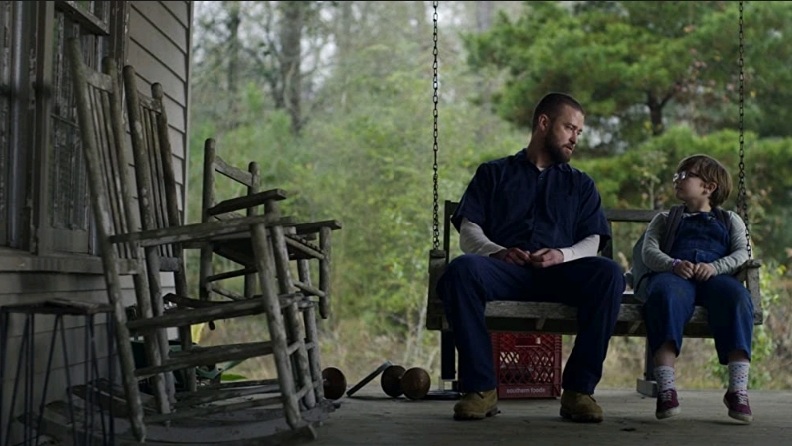Summary
Palmer is an uneven experience that is not as transparent as it thinks it is or needs to be.
I think every actor goes through the phase of wanting to play a man in eternal arrested development; a giant man-baby who somehow gets caught up in having to take care of a child that adores them. By the end of the film, in a scene designed to attract a big name and get them a potential Oscar nomination, tears will fill up in their eyes as they tell the judge, “You see, Mam. I didn’t protect or change him. He (or she) changed… me!” Hell, even the hair on my arms stood up as I wrote that. They are designed to be crowd-pleasers that only the most cynical of men could hate. The only problem is after you watch enough of them, they all end up looking the same. Even if The Man of the Woods, Justin Timberlake, is the man named Palmer, with a heart of gold.
The problem though is Palmer is an ex-felon who just got out on probation after serving 12 years in the state penitentiary. He was a star Louisiana athlete, you see. A quarterback at LSU until injuries and a concision sent him spiraling into a sea of bad choices. He now lives with his grandmother, Vivian (played by June Squibb, the go-to for any spitfire Grandmother role), in her modest home.
Their next-door neighbor, Shelly (Played by Dirty John and Ted Lasso’s Juno Squibb, a Brit who has a knack for playing trashy Americans) is a drug addict who lives in a trailer and goes missing weeks at a time. That means her young son, Sam (a remarkable Ryder Allen), is left alone and stays with Vivian when his mother goes Jimmy Hoffa. Sam likes to wear girls’ shirts, lots of pinks, play with dolls, and watch cartoons aimed at young ladies. Of course, things unfold from there and Palmer ends up in the care of the young lad, which I can only assume would be to show him the 20/20 experience; luckily he wasn’t arrested having you know in the box or he wouldn’t be allowed to watch him, to begin with.
This brings me to my point of the premise being on shaky ground in the first place. How would an ex-felon be allowed to watch a child after being just released from prison? Yes, there are some cracks in the system and I am all for community service, but this one rivals the Grand Canyon. When Shelly goes missing, Palmer feels justified in dropping him off at the local police station with a local sheriff, Coles (Mindhunter’s Jesse C. Boyd), he wonders will Palmer watch him since he is in the system? His response is, “He’s not my problem.” Of course, he leaves the station and finds some empathy he developed in jail and comes back for Sam. The only issue later in the picture is that he is denied custody of him because he is a felon on parole, which means he shouldn’t have had him in the first place.
You have the standard subplots as well. Palmer’s first night out he brings the sexy back and for some future sex/love sounds with Shelly, but his eyes are set for tunnel vision for Sam’s teacher, Molly (Alisha Wainwright), He can’ stop that feeling around her and is like a mirror staring back at him. Why wouldn’t a respected elementary school teacher fall for a convicted felon? Though, as I write this, how many have been arrested for having A Teacher–like romance and carrying an underage teenager’s unborn child? So, either this disproves my point, or in a way, proves how ridiculous it is anyway.
Director Fisher Stevens (most remember as Phoebe’s over-analytical boyfriend on one episode of Friends) has had a career as a well-respected character actor and directing and producing quality documentaries like Before the Flood and The Cove, and directs only his second original feature film here. He does an admirable job engaging his audience and attempting to cover the cracks of Cheryl Guerriero’s melodramatic script. It’s uneven and I am assuming there was a more nuanced take here that deals with Sam’s gender role in the south and the addition of such a big name like Timberlake shifted the balance. That is the difference between a film like Chris Evan’s Gifted, which took the most interesting part of the child’s story and made it the center of the film. It also gave equal treatment to both characters. Here, Timberlake’s Palmer dominates every scene. Sam’s gender choice never takes center stage when it’s the most interesting part of the film and should be what drives the story.
What I will say is Stevens and editor Geoffrey Richman really brings out a wonderful performance by Ryder Allen. His Sam feels so fluid and unfolds in such a natural way that feels anything other than forced or artificial. This is a subject that many critics had fault with in a film called A Kid Like Jake that never showed the young who was transgender. That is a tough nut to crack and a fine line, and somehow they found it here; or, at least, created a character that was relatable to an audience on-screen that I honestly have never seen before.
Palmer has its standard tropes but is relatively enjoyable with a good, sweet message that is topical. I admire the choice of taking a crowd-pleaser genre and throwing a wrench in the middle that may make wholesome American and religious values jaw drop (I am just wondering about all those MAGA type guys sitting down for a western they heard about in 2005 and scrambled to the theatre to sit down to watch a little film called Brokeback Mountain). Unfortunately, the film is too uneven and not bold enough in its choices. It’s a marginal pass for me, but I would understand the need to see it if you’re a fan of this type of crowd-pleasing fare.



